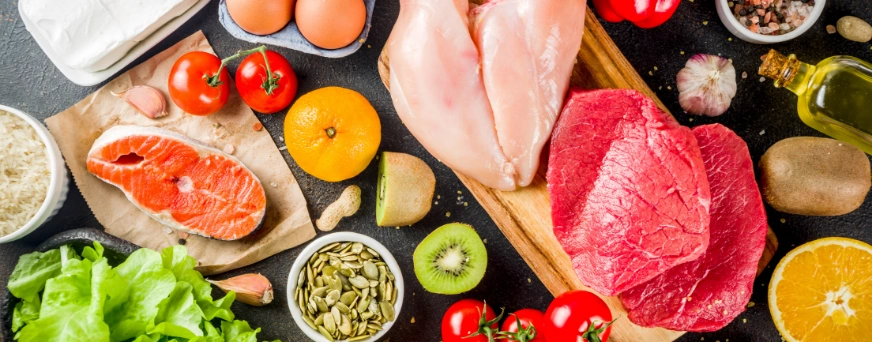High Cholesterol Diet Mistakes You’re Probably Making (and How to Fix Them)
Our Key Takeaway
Many Canadians make diet mistakes that raise cholesterol levels and harm heart health. Avoid cutting all fats, skipping fiber, or relying on low-fat processed foods. A balanced high cholesterol diet should include soluble fiber, lean proteins, and healthy fats from fish, nuts, and olive oil while limiting sodium and fried foods to naturally lower LDL and support heart health.
The issue of high cholesterol has been extremely common among the Canadian population; approximately, half of all individuals between 40 and 59 years old have the condition. The effect of high cholesterol is harmful to your heart.
Our daily lives are characterized by some widespread mistakes that have the power to influence the level of cholesterol. So maintaining a high cholesterol diet consists of sufficient fiber, heart-healthy and healthy fats, and no consumption of fried food, low-sodium, low-fat processed foods, and meat are mandatory.
Life Assure Product Quiz
Take our 30 second quiz and discover which Life Assure medical alert device is the right fit for you or a loved ones.
Life Assure Product Quiz
Take our 30 second quiz and discover which Life Assure medical alert device is the right fit for you or a loved ones.
5 common cholesterol-rich diet mistakes that people are unaware of

There are some common mistakes in our diet that we make with the notion of controlling cholesterol. With each passing day, these mistakes degrade heart health.
Ignoring healthy fats
Eating clean does not always mean avoiding eating fatty food. Healthy fats can be traced in nuts, seeds, and olive oil, which do not only balance your good cholesterol, but also reduce your bad cholesterol.
The mono and polyunsaturated fats combine to reduce the low-density lipoprotein cholesterol. These fats will give you a heart health advantage, which you will miss out on in case you fail to consume them.
A decrease in intake of healthy fats is usually accompanied by the intake of refined carbohydrates and added sugar in an attempt to contain the energy needs.
This is self-defeating because too much sugar and refined carbohydrates are turned into triglycerides, which are a form of fat that puts you at risk of getting heart disease.
This can only be corrected by eating more healthy fats per day. You need to eat monounsaturated fats that contain a lot of fatty acids, such as olive oil, canola oil, peanut oil, avocado, and cashews.
Mackerel, salmon, and sardines contain vitamin E, omega-3, and omega-6, while the soybean oil is readily available in the Canadian market.
Overeating Heart-Healthy Foods
After learning that heart-healthy foods help in maintaining healthy cholesterol, you begin to overeat them, including them in all of your meals. It is absolutely wrong, and here you should know why.
The overconsumption of heart-friendly food will result in excess energy, which will stimulate weight gain and increase LDL (bad) cholesterol and decrease HDL (good) cholesterol.
With excess fat in your body, particularly around your abdomen, more of the fatty acids are transported to the liver and this increases the levels of cholesterol.
The Heart and Stroke Foundation of Canada states that the quality and quantity of fat that you intake on a daily basis are important, since no matter how good a certain type of fat might be for your health, an overconsumption of any fat type may lead to an additional fat consumption, which is an additional factor of weight gain.
A well-balanced meal is your plan of contention regarding this oft-fancied fallacy. Your meal needs to have adequate vegetables and fruits to maintain a good balance of healthy fats, whole grains, plant-based proteins such as lentils and nuts rather than meat, as well as low-fat dairy items without added sugar.
Skipping Fiber-Rich Foods
It is wrongly believed that low-fiber foods can be used to lower LDL cholesterol. It is the reverse: you must incorporate high-soluble fiber food into your normal diet to enable it to eliminate LDL cholesterol and equalize HDL cholesterol in your body.
When you eat fiber-rich foods in your daily meals, the soluble fiber will create a gel-like substance in the digestive system that attaches cholesterol to the bile acids, which are then taken out of the body through the waste.
It claims that the amount of cholesterol entering your blood is reduced. Oats, barley, beans, and lentils; apples, blackberries, bananas, and pears; as well as artichokes, green peas, broccoli, Brussels sprouts, and sweet potatoes are only some of the readily available fiber-rich foods in Canada.
Relying on Low-Fat Processed Foods
Our eyes get stuck on low-fat foods but conveniently ignore processed foods. To this, processed foods are excruciatingly bad not only for cholesterol but also for all kinds of conditions. We get caught up in the low-fat foods, but it is easy to ignore the processed foods.
To this, processed foods are pathetically unfit not just to cholesterol but to any form of conditions. Though it can be used on the entire population, most people in Canada live on processed food, which contributes to obesity, which is among the major causes of high cholesterol.
The surplus fat in most cases is mixed with sugar, refined grains, and other starches to preserve the flavor and texture in processed foods. They cause a surge in the level of sugar in the blood and a disequilibrium in the level of triglycerides, changing the cholesterol ratios.
The ill effects of low-fat processed food are not just on obesity, but the study has discovered that the consumption of such food may cause inflammation and abnormal metabolism, a contributing factor to heart disease.
The most effective management of cholesterol is by consuming more whole foods, including the consumption of more soluble fiber in the form of oats, beans, apples, and lentils, which can lower the LDL cholesterol.
Not Watching Hidden Sodium and Fried Foods

Excessive consumption of both sodium and fried foods is harmful to the cholesterol level and heart health. Based on Health Canada reports, most Canadians consume more sodium than recommended.
As a matter of fact, sodium intake has no direct impact on the balance of cholesterol; however, we need a low-sodium diet to control heart health and blood pressure, which contribute significantly to the cholesterol balance.
The perfect amount of sodium per day that is recommended by various health organizations is 1500mg/day among most adults, and it is highly discouraged to take more than 2300 mg/day, which is one teaspoonful of salt.
You must not eat packaged foods that contain a lot of sodium, such as bakery products, mixed food, processed meat, foods with good condiments, and cheeses. We are all aware that fried foods are not good for our health in different ways.
It is also rich in bad fat, which may result in the saturated and trans fat in your food, which influences the good cholesterol. Another aspect of atherosclerosis is the excessive use of fried foods, which leads to the development of a cholesterol-containing plaque.
Conclusion
A high cholesterol diet is not just about avoiding fatty foods; it is about making more intelligent, consistent dietary and lifestyle choices. This diet should consist of soluble fiber, lean proteins, low-sugar and low-sodium levels, and proper portion control.











 Get Help With The Push Of A Button
Get Help With The Push Of A Button














